
ドストエフスキーの大作”罪と罰”を読んだことありますか?
Have you read Dostoevsky’s"Crime and Punishment”?
私は何度かトライしましたがいつも途中で挫折してしまっていました。
I tried several times, but I never made it to the last page.
今回は現代英語訳のオーディオブックでやっと克服しました。
This time I’ve finally overcome my problems by using the audiobook in modern English.
ちょっと時間がかかる庭仕事をしなくてはならなかったので、退屈しのぎにオーディオブックを聴くことにしました。
I picked up the audiobook to keep my company while doing a long and monotonous garden work.
庭仕事のような静かな単純作業の時はオーディオブックがぴったりです。
Audiobooks are perfect for quiet and simple tasks like gardening.
それに罪と罰のような名作は英語の場合オーディオブックでもEブックやキンドルでもほとんど皆無料です。
Besides, the English versions of most famous literature like Crime and Punishment is free in audiobook, ebook or Kindle format.
確かに名作シリーズは日本語でも無料で聴けるのがあるようですが、このような大作になると途中終でわってしまうようです。
Although many masterpieces are free in Japanese language, the free service tends to end halfway through.
私はオーディオブックが好きなのでカナダではいつも利用しています。
As I love audiobooks, I use them all the time in Canada.
日本でもオーディオブックを聴こうとしたのですが、どうもうまくできませんでした。
I tried listening to audiobooks in Japan, but it didn’t work well.
その理由の一つは環境とライフスタイルの違いです。
One of the reasons is the lifestyle difference between Japan and Canada.
カナダでは車の中で聴いたり散歩をしながら聴いたりしますが、日本ではほとんど電車やバス、また外を歩いても雑音が多いため言葉が聞き取りにくいからです。
In Canada, I listen while driving or while walking, but in Japan, especially in the big city like Tokyo, it is difficult to hear the words when on trains or buses or just walking outside because of the noise.
二つ目は日本語のオーディオブックが高いということ。
The second reason seems to be that the Japanese audiobooks are too expensive.
その理由は日本語がわかる人口が少ないためオーディオブックの制作コストが高くなるからだそうです。
It is because Japanese-speaking population is much fewer than that of English, which results in Japanese audiobooks being sold at high prices.
英語人口は15億人、日本語は全員としても一億人くらいなのでかなりの差があります。
The English-speaking population is 1.5 billion while the Japanese-speaking is only about 100 million.
最後の三つ目に日本語のオーディオブックの朗読時間/聴読時間が英語に比べて二倍近くかかるということに気がつきました。
Thirdly, I realized that the narrating or listening time of Japanese audiobooks is almost twice as long as the English.
例えば罪と罰の場合日本語では40時間、英語では読む人により差がありますが20−25時間のようです。
For example, it takes nearly 40 hours to finish listening in Japanese, whereas only 20-25 hours in English depending on a narrator.
YouTubeで西村俊彦さんという方の朗読で罪と罰を途中まで聴きました。ちょうど昭和の劇場を思い出させる重厚で19世紀のロシアを思い浮かばせる素晴らしい朗読でした。
I listened to Crime and Punishment halfway through by a narration of Mr. Toshihiko Nishimura on YouTube. It is an excellent naration with a strong flavour of 19th century Russia, which reminded me of the theatres in Showa era.
それに比べて英語版は分かりやすい口語訳なので、どちらかというとハリウッド映画を見ている気分です。
In contrast, the English version is based on the modern English translation and I almost feel as if I was watching a Hollywood movie.
今日のテーマの罪と罰に合わせて球根に猛毒のコリンを含む彼岸花(曼珠沙華)を選びました。
In order to align with today's theme, I chose Higanbana (Manjushage), which contains the highly poisonous "choline" in its bulbs.
彼岸花は大変美しい真っ赤な花ですが、毒のためか何か不吉な花と呼ばれることがあります。
Higanbana is a very beautiful bright red flower, however, it is often called an ominous flower perhaps because of its poison
英語ではスパイダー・リリーとよばれています。日本語と違って至って明るいですね。
In Engliush it is simply called Spider Lilly. Unlike Japanese name, it doesn't sound dark or sinister at all, does it?
それでも彼岸花が不吉で情熱的な花に見えるのは私だけでしょうか?
Is it only I who still feel that Higanbana is an uncanny yet a passionate flower?
Have you read Dostoevsky’s"Crime and Punishment”?
私は何度かトライしましたがいつも途中で挫折してしまっていました。
I tried several times, but I never made it to the last page.
今回は現代英語訳のオーディオブックでやっと克服しました。
This time I’ve finally overcome my problems by using the audiobook in modern English.
ちょっと時間がかかる庭仕事をしなくてはならなかったので、退屈しのぎにオーディオブックを聴くことにしました。
I picked up the audiobook to keep my company while doing a long and monotonous garden work.
庭仕事のような静かな単純作業の時はオーディオブックがぴったりです。
Audiobooks are perfect for quiet and simple tasks like gardening.
それに罪と罰のような名作は英語の場合オーディオブックでもEブックやキンドルでもほとんど皆無料です。
Besides, the English versions of most famous literature like Crime and Punishment is free in audiobook, ebook or Kindle format.
確かに名作シリーズは日本語でも無料で聴けるのがあるようですが、このような大作になると途中終でわってしまうようです。
Although many masterpieces are free in Japanese language, the free service tends to end halfway through.
私はオーディオブックが好きなのでカナダではいつも利用しています。
As I love audiobooks, I use them all the time in Canada.
日本でもオーディオブックを聴こうとしたのですが、どうもうまくできませんでした。
I tried listening to audiobooks in Japan, but it didn’t work well.
その理由の一つは環境とライフスタイルの違いです。
One of the reasons is the lifestyle difference between Japan and Canada.
カナダでは車の中で聴いたり散歩をしながら聴いたりしますが、日本ではほとんど電車やバス、また外を歩いても雑音が多いため言葉が聞き取りにくいからです。
In Canada, I listen while driving or while walking, but in Japan, especially in the big city like Tokyo, it is difficult to hear the words when on trains or buses or just walking outside because of the noise.
二つ目は日本語のオーディオブックが高いということ。
The second reason seems to be that the Japanese audiobooks are too expensive.
その理由は日本語がわかる人口が少ないためオーディオブックの制作コストが高くなるからだそうです。
It is because Japanese-speaking population is much fewer than that of English, which results in Japanese audiobooks being sold at high prices.
英語人口は15億人、日本語は全員としても一億人くらいなのでかなりの差があります。
The English-speaking population is 1.5 billion while the Japanese-speaking is only about 100 million.
最後の三つ目に日本語のオーディオブックの朗読時間/聴読時間が英語に比べて二倍近くかかるということに気がつきました。
Thirdly, I realized that the narrating or listening time of Japanese audiobooks is almost twice as long as the English.
例えば罪と罰の場合日本語では40時間、英語では読む人により差がありますが20−25時間のようです。
For example, it takes nearly 40 hours to finish listening in Japanese, whereas only 20-25 hours in English depending on a narrator.
YouTubeで西村俊彦さんという方の朗読で罪と罰を途中まで聴きました。ちょうど昭和の劇場を思い出させる重厚で19世紀のロシアを思い浮かばせる素晴らしい朗読でした。
I listened to Crime and Punishment halfway through by a narration of Mr. Toshihiko Nishimura on YouTube. It is an excellent naration with a strong flavour of 19th century Russia, which reminded me of the theatres in Showa era.
それに比べて英語版は分かりやすい口語訳なので、どちらかというとハリウッド映画を見ている気分です。
In contrast, the English version is based on the modern English translation and I almost feel as if I was watching a Hollywood movie.
今日のテーマの罪と罰に合わせて球根に猛毒のコリンを含む彼岸花(曼珠沙華)を選びました。
In order to align with today's theme, I chose Higanbana (Manjushage), which contains the highly poisonous "choline" in its bulbs.
彼岸花は大変美しい真っ赤な花ですが、毒のためか何か不吉な花と呼ばれることがあります。
Higanbana is a very beautiful bright red flower, however, it is often called an ominous flower perhaps because of its poison
英語ではスパイダー・リリーとよばれています。日本語と違って至って明るいですね。
In Engliush it is simply called Spider Lilly. Unlike Japanese name, it doesn't sound dark or sinister at all, does it?
それでも彼岸花が不吉で情熱的な花に見えるのは私だけでしょうか?
Is it only I who still feel that Higanbana is an uncanny yet a passionate flower?










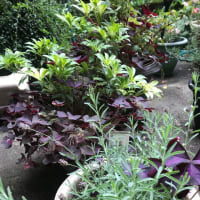


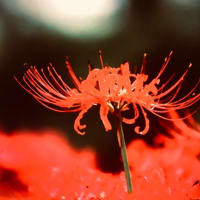

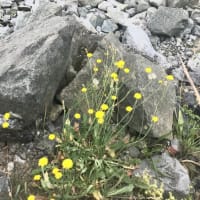


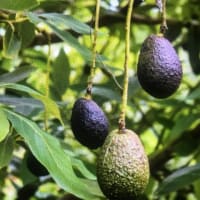
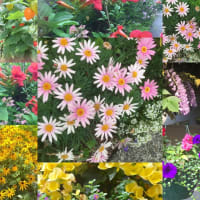
※コメント投稿者のブログIDはブログ作成者のみに通知されます